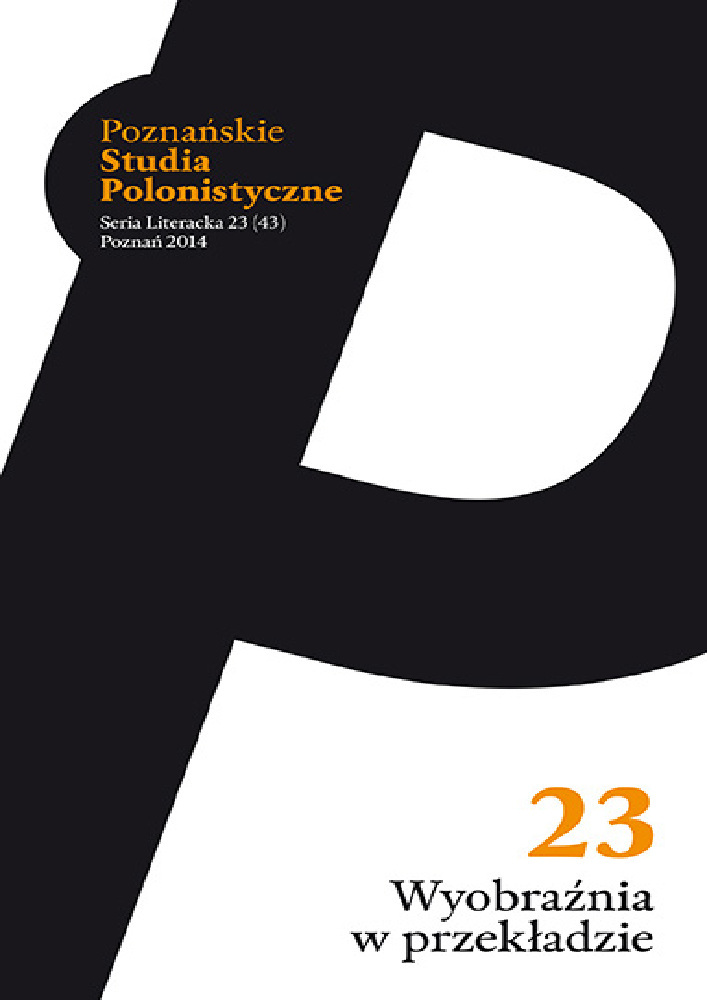Abstract
The article presents selected translations of Yiddish literature into English, focusing on the influence of translator’s choices on forming the topography and realities of life in Poland before the Second World War. Elements related to material culture and multilingual quality of represented world are often eliminated or simplified. One of the main problems for translators, who usually do not know Polish, are Polish words and expressions, which are frequent in Yiddish literature written by authors of Polish extraction. Additional problems occur when Polish is used as intermediary between Yiddish and Polish. A reader who knows Eastern European realities receives an image of reality, which has been purposefully modified to facilitate reception in America, so that represented reality turns out to be more alien and exotic than in direct translation from Yiddish into Polish. This phenomenon occurs not only in fiction, but also in documentary texts, e.g. in the memorial books, which have been popular in Poland recently, and which are often translated from English intermediary texts. All this leads to important discrepancies and tensions between reality as it is imagined, remembered, and documented. Examples presented in the article come from texts by Isaac Bashevis Singer, Shalom Asch, and the Zgierz memorial book.References
Adamczyk M., Jeszcze Singer o Warszawie (list do redakcji), „Literatura na Świecie” 1981, nr 3.
Asz S., Miasteczko, poprawiony przekład anonimowy z 1911 r., oprac., posłowie M. Adamczyk-Garbowska, Janowiec nad Wisłą 2003.
Asch S., The Little Town, w: idem, Tales of My People, New York 1970.
Baszewis I., Der szpinozist, w: idem, Gimpl tam un andere dercejlungen, Nju Jork 1963.
Baszewis I., Di familje Muszkat, t. 1, Nju Jork 1950.
Berman A., Przekład jako doświadczenie obcego, tłum. U. Hrehorowicz, w: Współczesne teorie przekładu. Antologia, red. P. Bukowski, M. Heydel, Kraków 2009.
Księga Pamięci Zgierza spisana przez tych, którzy przeżyli, tłum. Z. O ’Rourke, Zgierz 2009.
Majewski J.S., To była ulica bukinistów, „Gazeta Wyborcza – Warszawa”, 13 lipca 2012.
Oz A., Opowieść o miłości i mroku, tłum. L. Kwiatkowski, Warszawa 2005.
Prószyński S., Warszawa Singera (list do redakcji), „Literatura na Świecie” 1980, nr 5.
Sefer Zgierz; mazekeret necach li-kehila jehudit be-Polin = Sejfer Zgierz; cum ondenk fun a jidiszer kehile in Pojln, t. 1, red. D. Sztokfisz, Tel Awiw 1975.
Singer I.B., Józef i Koza, czyli ofiara dla Wisły, tłum. M. Adamczyk-Garbowska, „Akcent” 1992, nr 1–2.
Singer I.B., Józef i Koza, tłum. E. Petrajtis O’Neill, w: idem, Opowiadania, Warszawa 1993.
Singer I.B., Każda żydowska ulica w Warszawie była samodzielnym miastem…,
w: Felietony, eseje, wywiady, tłum. z jidysz T. Kuberczyk, Warszawa 1993.
Singer I.B., Opowiadania dla dzieci, tłum. A. Polkowski, Poznań 2005.
Singer I.B., Przywołany do życia, w: idem, Spinoza z ulicy Rynkowej, Warszawa
Singer I.B., Przywrócony życiu, w: idem, Spinoza z ulicy Rynkowej, Gdańsk 1995.
Singer I.B., Rodzina Muszkatów, t. 1, tłum. J. Borowik, Warszawa 1992.
Singer I.B., Spinoza z ulicy Targowej, tłum. M. Adamczyk, „Literatura na Świecie” 1979, nr 4.
Singer I.B., Spinoza z ulicy Rynkowej, w: idem, Spinoza z ulicy Rynkowej, tłum. M. Adamczyk-Garbowska, Gdańsk 1995.
Singer I.B., Stories for Children, New York 1985.
Singer I.B., Szatan w Goraju, tłum. M. Adamczyk-Garbowska, Ch. Shmeruk, Wrocław 1995.
Singer I.B., Szatan w Goraju, tłum. J. Marzęcki, S. Sal, Warszawa 1992.
Singer I.B., Tanchum, w: idem, Old Love, New York 1979.
Singer I.B., Tanchum, w: idem, Późna miłość, tłum. M. Adamczyk-Garbowska, Wrocław 1993.
Singer I.B., The Family Moskat, tłum. A.H. Gross, New York 1973.
Singer I.B., The Spinoza of Market Street, w: idem, The Spinoza of Market Street, New York 1980.
Tam był kiedyś mój dom… Księgi pamięci gmin żydowskich, wybór, oprac., przedmowa M. Adamczyk-Garbowska, A. Kopciowski, A. Trzciński, Lublin 2009.
Warszawski I. [Singer I.B.], Josef un Koza oder a korbn fun der Wejsl, „Forwerts”, 6, 12 i 13 lipca 1968.
License
Authors
Authors of texts accepted for publication in „Poznańskie Studia Polonistyczne. Seria Literacka” are required to complete, sign and return to the editor's office the Agreement for granting a royalty-free license to works with a commitment to grant a CC sub-license.
Under the agreement, the authors of texts published in „Poznańskie Studia Polonistyczne. Seria Literacka” grant the Adam Mickiewicz University in Poznań a non-exclusive, royalty-free license and authorize the use of Attribution-NoDerivatives 4.0 International (CC BY-ND 4.0)Creative Commons sub-license.
The authors retain the right to continue the free disposal of the work.
Users
Interested Internet users are entitled to use works published in „Poznańskie Studia Polonistyczne. Seria Literacka” since 2016, for non-commercial purposes only, under the following conditions:
- attribution - obligation to provide, together with the distributed work, information about the authorship, title, source (link to the original work, DOI) and the license itself.
- no derivatives - the work must be preserved in its original form, without the author's consent it is not possible to distribute the modified work, such as translations, publications, etc.
Copyrights are reserved for all texts published before 2016.
Miscellaneous
Adam Mickiewicz University in Poznań retains the right to magazines as a whole (layout, graphic form, title, cover design, logo etc.).
